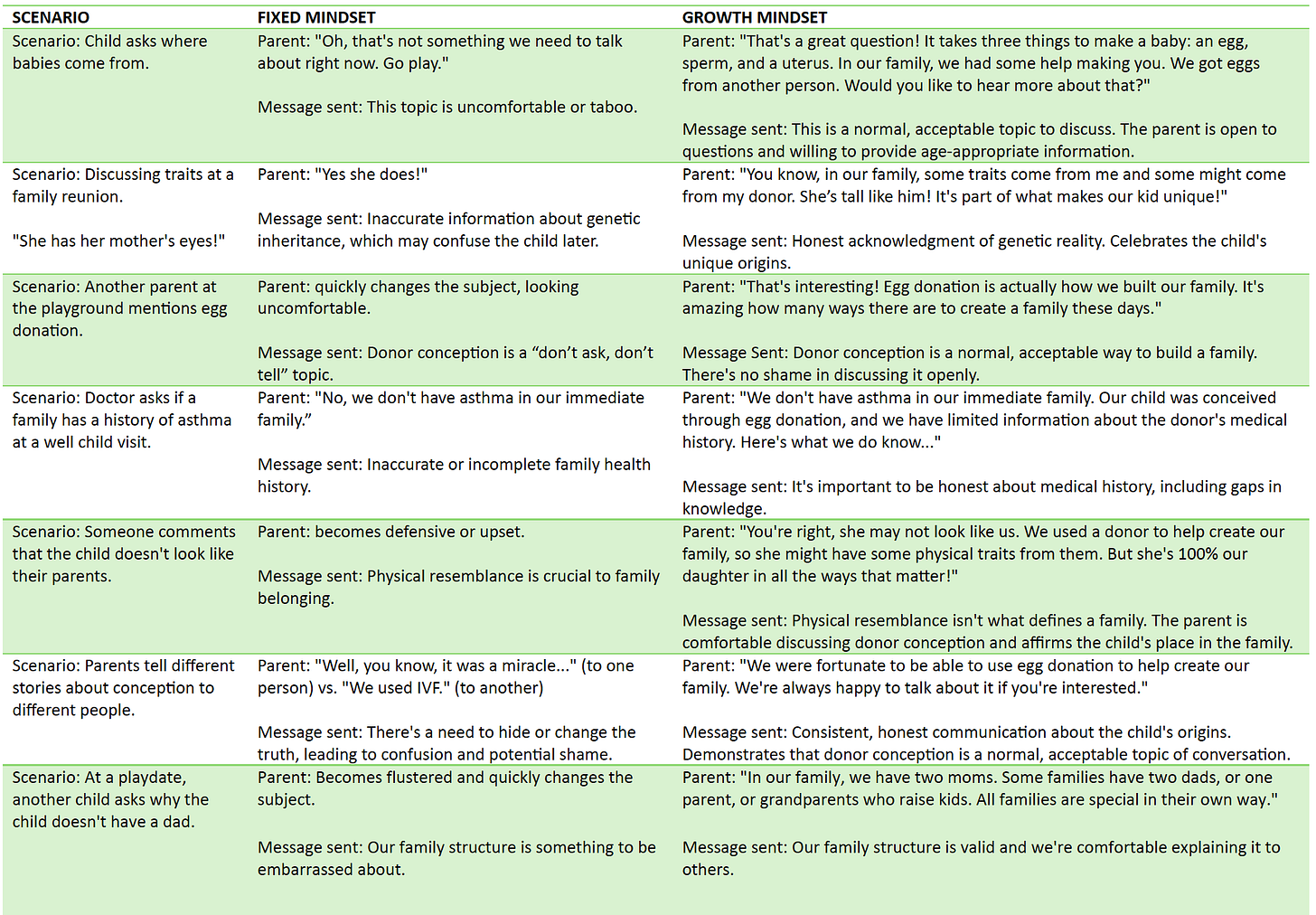Before having my children, I never noticed how frequently donor-conception themes naturally appear in everyday life. Now, I see them everywhere - in casual comments about genetic traits, children's books about families, or during doctor's appointments discussing medical history. These moments were always there, but I wasn't attuned to them until donor conception became part of our family story. Now, it's impossible to "unsee" these opportunities for natural conversations about my children's origins. It's shown me that discussing donor conception doesn't require formal sit-downs - it's already woven into our daily experiences.
As parents of kids born from donor gametes and embryos, it’s easy to get caught up in the “when” and “how” of discussing their origins. But here's a truth that might surprise you: Your child is already learning about donor conception, even if you haven't said a word about it yet.
How is this possible? Let’s break it down.
When you cuddle your child and respond to their needs, you teach them that family is defined by love and care.
Every time your child sees a family—whether in a book, on TV, or at the playground—they receive messages about family structures.
When you celebrate special occasions with close friends who aren't biologically related, you teach them that family can be chosen.
When someone says, "She has her grandmother's eyes" or "He got his height from his father," they receive messages about genetic inheritance.
When you visit cousins three times removed once a year, you teach them that family can include people we don't see often but are still connected to.
When you talk about where your child got their sense of humor, musical talent, or quiet demeanor, they receive messages about the complex interplay of genetics and environment in identity formation.
When you share a tradition passed down through generations, you teach them that family heritage and connections can transcend time.
Every time you go to a well-child visit at a doctor's office, they receive messages about how their health is connected to their family’s health history.
So, while you might feel like the donor conception conversation hasn’t started, the truth is, you’re already in it. These interactions and conversations become subtle lessons about what constitutes a family, how people are connected, and where individuals get their traits. Your actions and reactions contribute to your child's understanding of their origins and place in the world.
You Set the Vibe
Children absorb everything around them, especially parents' emotional cues. During their first three years, while forming millions of neural connections, they're developing fundamental understandings of relationships, belonging, and identity. Their natural curiosity makes early honesty valuable, even before full comprehension. Your reactions to conversations about family building and genetics become their blueprint—calm openness teaches these topics are normal, while discomfort suggests they're taboo. By creating an atmosphere of trust and open communication, you establish the foundation they'll need to explore their identity and origins, shaping how they'll process these topics long-term.
Child-Led vs. Child-Centered Approach
A child-led approach to talking about donor conception might sound ideal—wait for them to ask the questions, right? While this may seem respectful of the child's curiosity, it can inadvertently place too much responsibility on the child to initiate important conversations. Children cannot ask about things they don't know exist, and they may avoid topics they sense are sensitive to protect their parents' feelings. Without proactive parent guidance, they might develop misconceptions or find themselves managing complex social dynamics around who knows about their origins. The burden of initiating these complex conversations shouldn't fall on children's shoulders.
Instead, a child-centered approach balances proactive parent leadership with sensitivity to the child's emotional readiness. Think about toothbrushing1: We don't wait for our kids to ask about dental hygiene—we proactively teach them, adjusting our approach as they grow. We start by brushing for them, then guide their hand, then supervise, and finally trust them to manage independently. Talking about donor conception can work the same way. We provide age-appropriate information, support their growing understanding, and gradually give them more autonomy in exploring their identity.
Finding the Balance
There's an important difference between normalizing being donor-conceived and making donor conception a defining characteristic of a family. Normalizing means creating an environment where it's treated as a known, valid part of your family's story. In contrast, making donor conception a focus means allowing it to overshadow other aspects of family life. While being donor-conceived is part of the story, it shouldn't become the main narrative of one’s childhood or family life.
From listening to DCP, we know that being donor-conceived means different things to different people - some see it as a minor detail, while others feel it's a significant part of who they are. As parents, our role is to create space for our kids to figure that out for themselves without pressure to feel any particular way about it.
I first learned of this analogy from Donor Conceived Community.




This is so good, thank you Laura!
Love!